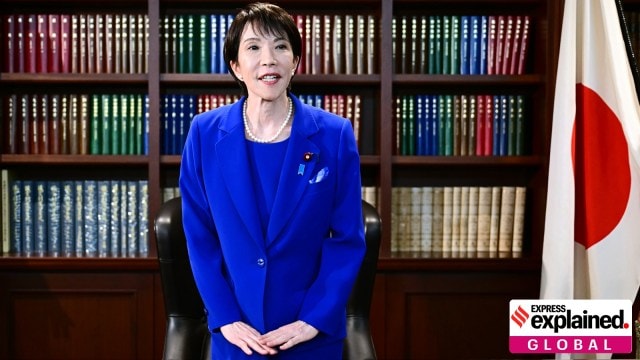Japan set to get new PM: How China views Sanae Takaichi, why that matters
The two major players in India's neighbourhood, China and Japan, are set for recalibrated engagement under a new PM. An expert explains what is worth watching out for.
 Sanae Takaichi, the newly elected leader of Japan's ruling party, the Liberal Democratic Party (LDP), at the party leader's office in Tokyo Saturday, Oct. 4. (Photo: AP)
Sanae Takaichi, the newly elected leader of Japan's ruling party, the Liberal Democratic Party (LDP), at the party leader's office in Tokyo Saturday, Oct. 4. (Photo: AP) Two major players in India’s neighbourhood, both economically and strategically, are China and Japan. With US President Donald Trump’s unorthodox policies upending global certainties, relationships in its backyard have attained more significance for India. In this context, Japan’s ruling political party electing a new leader, and China’s attitude towards her, are worth tracking for New Delhi.
The results of the presidential election for Japan’s ruling Liberal Democratic Party were announced on October 4. Sanae Takaichi defeated her closest rival Shinjiro Koizumi to become the first woman to lead the conservative party that has long dominated Japan’s politics. She is now poised to become Prime Minister, by October 15.
How has China reacted?
China, as Japan’s watchful neighbour with high stakes in Japan’s political and economic stability, was uncharacteristically quick in expressing Beijing’s views on Takaichi’s win. A Chinese foreign ministry spokesperson said while this was Japan’s internal matter, it was hoped she would pursue a proactive and rational policy toward China.
On the other hand, the official media as well as many scholars in China doubted if Takaichi would be able to break the post-Shinzo Abe “curse” in Japanese politics: a new prime minister every year. Their lack of confidence was based on factors such as Takaichi’s ultra-conservative political outlook and lack of foreign policy experience.
Who is Sanae Takaichi?
A former economic security minister, 64-year-old Lower House lawmaker Takaichi has over 30 years of experience in parliament. A protege of late former Prime Minister Shinzo Abe, she has served in several key portfolios both within the party — as policy chief and general affairs council chair — and in the Cabinet.
From 2022 to 2024, she was Japan’s economic security minister. She also holds the record of being the longest-serving minister for internal affairs, a post she held in several stints.
Significantly, Takaichi has long been the poster child of the LDP’s conservative wing, championing causes such as high government spending, a hawkish approach to China and a large defence budget.
An admirer of former British Prime Minister Margaret Thatcher, Takaichi is often called Japan’s “iron lady.”
While political analysts in Japan generally agree that Takaichi’s first task will be to unite the divided LDP, she will need to quickly get up to speed on the foreign policy front too, as two of Japan’s most important partners are the US and China — the former strategically, the latter economically — whose bilateral ties are unusually complicated at present.
She is expected to meet both Donald Trump and Xi Jinping later this month at the Asia Pacific Economic Cooperation summit, to be held in South Korea. In spite of her ultra-conservative views on Beijing, Chinese scholars have noted that during her campaign, Takaichi did call China an “important neighbour.”
Why did Takaichi tone down her anti-China pitch during the recent campaign?
Many Chinese scholars cite as evidence of Takaichi’s ‘hawkish’ stance her annual visit to the Yasukuni Shrine. The Yasukuni Shrine is a Shinto shrine located in Chiyoda, Tokyo. It was founded by Emperor Meiji in June 1869 and commemorates those who died in the service of Japan, from the Boshin War of 1868–1869, the two Sino-Japanese Wars, 1894–1895 and 1937–1945 respectively, and the First Indochina War of 1946–1954. Takaichi’s most recent visit to the shrine was on August 15.
Why did she then stay away from stressing her anti-China policies during the LDP leadership contest? Professor Lian Degui, director, Centre for Japanese Studies at the Shanghai International Studies University, explained in a signed commentary within hours of her victory that the new leader faces pressure to “handle Japan’s relations with China well.”
Why is the Chinese social media comparing her to Liz Truss?
On China’s vibrant social media and digital news platforms, the immediate joke after Sanae Takaichi’s win was that she would create history in Japan’s politics just like the former British Prime Minister Truss.
Liz Truss was Prime Minister of the United Kingdom from September to October 2022. On her fiftieth day in office, she stepped down amid a government crisis, making her the shortest-serving prime minister in British history. As observed by the official Chinese media China Daily, “the true paradox of her [ Takaichi’s] potential premiership is that the ideological purity that rallied the conservative LDP base now threatens her ability to govern.”
However, others believe Takaichi can last her term. Professor Lian Degui, cited above, has given two reasons for this confidence.
For long, China and Japan have had a ‘politically cold, economically hot’ relationship. If Takaichi is truly a protégé of Shinzo Abe, who was politically conservative himself, she will display Abe-like pragmatism and strengthen economic relations with China.
Two, Japan’s economy is currently heavily dependent on China. The US is exerting continued pressure on the Japanese economy. Japan exports over 95% of its goods. If Sino-Japanese economic relations are damaged, Japan’s economy will face difficulties. Thus, once she becomes prime minister, Sanae Takaichi will have to choose between her political posturing and hard economic realities.
Hemant Adlakha teaches Chinese at the Jawaharlal Nehru University in New Delhi. He is also Vice Chairperson and an Honorary Fellow, Institute of Chinese Studies (ICS), Delhi.
- 01
- 02
- 03
- 04
- 05






































